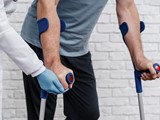What to Expect When Recovering from Knee Arthroplasty

Knee arthroplasty is a surgical procedure where the joint of the knee is replaced. It is a potential treatment for numerous knee-related conditions and problems, including severe injuries, bone deformities, chronic joint infections, and arthritis.
Doctors may recommend a knee arthroplasty if you have severe knee pain that gets in the way of regular daily activities. Physicians may also recommend it if you can’t walk or climb stairs, or if you struggle to get up from a chair, with no improvements seen during conventional physiotherapy.
Various parts and materials are used to reconstruct the knee joint. The essential functional elements include the metal cap that replaces the end of the thigh bone, the tibial component that substitutes part of the tibia, and the patellar component that fixes the rear of the kneecap. Physicians use mixed materials with differing properties to achieve optimal results, including titanium, cobalt-chromium, polyethylene, ceramic, and bone cement. These keep everything in place while minimizing the risk of adverse immune responses.
In this article, you’ll learn how to prepare for knee arthroplasty and what to expect from recovery.
Preparing for Your Knee Arthroplasty
You must stop drinking and smoking before a knee arthroplasty and follow your doctor’s recommendations. Medics prefer patients to arrive sober because of the adverse effects that alcohol and tobacco smoke can have on the operation and recovery.
For instance, smoking and drinking before an arthroplasty can:
- Decrease nutrient delivery to affected tissues, increasing the risk of infection and necrotic tissue
- Disrupt bone formation after surgery, preventing optimal healing from occurring and increasing recovery times
- Increase the inflammatory response around the surgical site
- Make post-surgical rehabilitation more challenging because of impaired lung function
If you have a surgery booked, you should quit smoking as soon as possible. The earlier you can stop, the less adverse an impact it will have.
You should also stop drinking between 24 and 48 hours before going into the operating room. If you drink too close to the time of your operation, it can interfere with liver function and the effect of the anesthetic. If you have had alcohol 24 to 48 hours before surgery, be sure to tell your doctor.
In addition to avoiding drinking and smoking before your arthroplasty, you may also need to stop taking some medications temporarily as well. Be sure to check with your surgeon first before changing your routine. Medics can provide you with a list of drug interactions you want to avoid.
Immediate Post-Surgery Symptoms
Immediately following surgery, you will notice some pain and swelling. However, these will subside over time.
Keep the affected leg high and apply ice to soothe the inflammation. Elevating the leg above the heart can help control swelling and promote drainage from the surgery site, improving recovery prospects. Adding ice packs every 15 to 20 minutes can also reduce the amount of inflammation your body produces in response to the surgery. However, avoid keeping the area cold for extended periods of time, as this may lead to further tissue damage and prevent inflammatory responses from operating optimally.
Your surgeon may prescribe pain medication after knee surgery. Follow their instructions on when you should use it and how much to take.
Intermediate Recovery
Intermediate recovery typically occurs somewhere between one week and one month after the operation. However, everyone responds differently to surgery.
During this stage, you will likely walk with the assistance of a cane or another device. You may find yourself moving slower than you usually do.
You will notice some residual swelling at this stage. However, it will be significantly less than the swelling you experience immediately after your operation.
You may also need to continue using pain management medication at a reduced dose. Your surgeon will tell you when you should resume taking your regular medication if you weren’t allowed to use it prior to the procedure.
Continuing to move the joint will help with recovery. Regular exercise will improve your range of motion and make it more straightforward to extend your leg as the weeks go by.
During this phase, you should notice your muscular strength improving. However, you must continuously exercise the affected leg to strengthen all the surrounding tissue and ensure a more complete recovery.
During intermediate recovery, you can resume basic activities like swimming or cycling. However, you shouldn’t return to driving unless you are cleared by your surgeon. Avoid over-exerting yourself, as strenuous activity can prolong recovery and cause further injury. If you suffer a fall or notice any sudden pain, talk to your doctor immediately.
Late Recovery
After some time (usually one month to six weeks), you should be able to walk free of assistance. That means you can stop using a cane or other assistive devices.
During this phase, you should continue a balanced regimen of rest and rehabilitation. Listen to your body. Don’t push it further than recovery allows.
Focus on eating a nutritious diet with plenty of fruits, vegetables, and whole grains. Providing your body with these foods will give it the nutrients it needs to recover and thrive.
Also, ensure you remain hydrated. Drink plenty of fluids to flush out toxins and keep your joints lubricated.
Avoid staying up late. Instead, set a regular bedtime so your body has plenty of sleep to do all the necessary repair work.
Finally, ensure you manage stress levels throughout the day. Relaxing more will help your body recover faster.
Get a Knee Replacement
Getting knee replacement surgery is a significant decision. It should only be considered after exploring all other options. Once you determine that having an operation is the best route for you, you’ll work with a surgeon to ensure the best possible outcome. Medics will advise you throughout the process, including how to prepare for the operation and what to do afterward to maximize recovery.
For knee replacement surgery options in Idaho Falls and Pocatello, contact Altenburg Joint Replacement.



